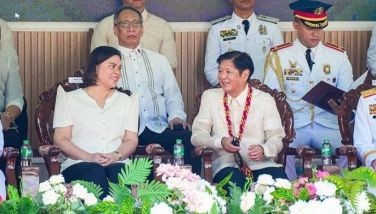PCGG: Privatization to generate funds for CARP
December 3, 2005 | 12:00am
The Presidential Commission on Good Government (PCGG) said yesterday it will continue to carry out one of its major tasks, which is to privatize surrendered and recovered ill-gotten assets to generate additional funds for the Comprehensive Agrarian Reform Program (CARP).
The PCGG said that as of Oct. 31 this year, the agency had remitted to the Bureau of Treasury a total of P76.905 million for CARP.
The PCGG’s statement, signed by its Public Information Office (PIO) chief Nick Suarez, was issued in order to clarify a news report that "the commission has not achieved much of its aim for 2005."
"Efforts to privatize major tickets such as television stations RPN-9 and IBC-13, including real estate assets, are already in full swing as the Privatization and Management Office — headed by its newly appointed chief privatization officer Jose Bengzon III — is already in the process of accepting proposals from prospective financial advisers to conduct the appraisal of the two television stations," the agency said.
The PCGG emphasized that privatization is a process that is not accomplished overnight.
"There are procedures and requirements set by law that need to be followed," the PCGG said.
The PCGG also said that market conditions are very critical to the privatization process. While the agency has been trying to sell the assets recovered from the late dictator Ferdinand Marcos, his family and cronies, potential buyers do not seem to be currently interested due to poor market conditions.
PCGG officials are "looking at other alternative modes of privatization in coordination with the Privatization and Management Office and the Privatization Council of the Department of Finance," they said.
A news report said the agency had planned to sell this year sequestered assets worth P18 billion, including three state-owned broadcast networks with an estimated combined value of P4.3 billion.
The PCGG also planned to sell off several real estate properties with a total value of P14.2 billion. Among the real estate properties targeted for privatization this year are the "Payanig" property along Ortigas Avenue in Pasig City. The 184,891-square-meter site, valued at P13.8 billion, is still the subject of a legal battle.
The news report said the PCGG had planned to sell government shares in a number of private corporations, including 15,230 shares in the Philippine Long Distance Telephone Co. The agency also seeks to sell P118 million worth of shares from other companies.
Last September, the PCGG reported that more than $1 billion of funds recovered from Marcos’ family and friends had been plowed into the government’s land reform program.
The PCGG turned over about P57.29 billion ($1.019 billion) between 1987 and August 2005, Commissioner Nicasio Conti said in a statement signed and issued by the anti-corruption body’s chief information officer, Nick Suarez.
After Marcos was toppled in a military-backed popular revolt in 1986, the government passed a law allocating any recovered assets to CARP.
The PCGG was created by former President Corazon Aquino through Executive Order 1 to recover ill-gotten wealth from the Marcos family and their cronies.
All cash and assets recovered by the PCGG go to CARP, established by Mrs. Aquino. Mrs. Arroyo earlier said some P8 billion was set aside to compensate almost 10,000 victims of human rights abuses while the country was under martial law.
Most of the funds generated by PCGG came from compromise agreements sealed between the government and cronies of Marcos, the agency said. Some Marcos allies resorted to out-of-court settlements to escape prosecution.
About 62.64 percent of the funds, amounting to P35.89 billion, were transferred during the term of Mrs. Arroyo, the PCGG said.
The commission said it expected to contribute an additional P23.18 billion from the sale of jewelry, real estate, shares and television and radio stations once controlled by Marcos allies and relatives.
Marcos ruled the Philippines for 20 years, much of it under martial law, during which he, his family and allies are accused of plundering state coffers.
A popular revolt toppled Marcos and sent him into exile in the United States in 1986, where he died in 1989.
The PCGG said that as of Oct. 31 this year, the agency had remitted to the Bureau of Treasury a total of P76.905 million for CARP.
The PCGG’s statement, signed by its Public Information Office (PIO) chief Nick Suarez, was issued in order to clarify a news report that "the commission has not achieved much of its aim for 2005."
"Efforts to privatize major tickets such as television stations RPN-9 and IBC-13, including real estate assets, are already in full swing as the Privatization and Management Office — headed by its newly appointed chief privatization officer Jose Bengzon III — is already in the process of accepting proposals from prospective financial advisers to conduct the appraisal of the two television stations," the agency said.
The PCGG emphasized that privatization is a process that is not accomplished overnight.
"There are procedures and requirements set by law that need to be followed," the PCGG said.
The PCGG also said that market conditions are very critical to the privatization process. While the agency has been trying to sell the assets recovered from the late dictator Ferdinand Marcos, his family and cronies, potential buyers do not seem to be currently interested due to poor market conditions.
PCGG officials are "looking at other alternative modes of privatization in coordination with the Privatization and Management Office and the Privatization Council of the Department of Finance," they said.
A news report said the agency had planned to sell this year sequestered assets worth P18 billion, including three state-owned broadcast networks with an estimated combined value of P4.3 billion.
The PCGG also planned to sell off several real estate properties with a total value of P14.2 billion. Among the real estate properties targeted for privatization this year are the "Payanig" property along Ortigas Avenue in Pasig City. The 184,891-square-meter site, valued at P13.8 billion, is still the subject of a legal battle.
The news report said the PCGG had planned to sell government shares in a number of private corporations, including 15,230 shares in the Philippine Long Distance Telephone Co. The agency also seeks to sell P118 million worth of shares from other companies.
Last September, the PCGG reported that more than $1 billion of funds recovered from Marcos’ family and friends had been plowed into the government’s land reform program.
The PCGG turned over about P57.29 billion ($1.019 billion) between 1987 and August 2005, Commissioner Nicasio Conti said in a statement signed and issued by the anti-corruption body’s chief information officer, Nick Suarez.
After Marcos was toppled in a military-backed popular revolt in 1986, the government passed a law allocating any recovered assets to CARP.
The PCGG was created by former President Corazon Aquino through Executive Order 1 to recover ill-gotten wealth from the Marcos family and their cronies.
All cash and assets recovered by the PCGG go to CARP, established by Mrs. Aquino. Mrs. Arroyo earlier said some P8 billion was set aside to compensate almost 10,000 victims of human rights abuses while the country was under martial law.
Most of the funds generated by PCGG came from compromise agreements sealed between the government and cronies of Marcos, the agency said. Some Marcos allies resorted to out-of-court settlements to escape prosecution.
About 62.64 percent of the funds, amounting to P35.89 billion, were transferred during the term of Mrs. Arroyo, the PCGG said.
The commission said it expected to contribute an additional P23.18 billion from the sale of jewelry, real estate, shares and television and radio stations once controlled by Marcos allies and relatives.
Marcos ruled the Philippines for 20 years, much of it under martial law, during which he, his family and allies are accused of plundering state coffers.
A popular revolt toppled Marcos and sent him into exile in the United States in 1986, where he died in 1989.
BrandSpace Articles
<
>
- Latest
- Trending
Trending
Latest
Trending
Latest
Recommended































